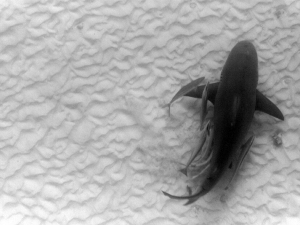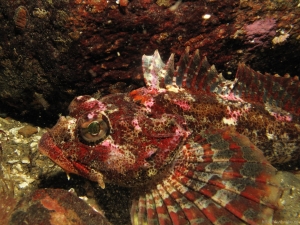In 2008 we took a trip to Playa Del Carmen, Mexico. One of the most amazing experiences we had was going on a shark dive, where we dropped into 70 feet of clear tropical water, and drifted in the current as a few large bullsharks swam around us. Amazing animals. We later remarked how much bigger they were than we’d imagined, and how awesome of an experience it was to swim with sharks on a non-baited dive.
Today I found out that a fisherman from a nearby town, knowing full well the significance of those bullsharks to the tourist industry and local economy of Playa Del Carmen, decided his making a quick buck was more important, and killed 9 of the bullsharks.
Absolutely ridiculous. Estimates are pretty high for what the impact to the local economy will be, as shark dives were one of the big reasons for tourists to head down there and spend money — The worst part is, the sharks were likely killed for their fins, which provide no nutritional value, and in fact are full of contaminants which accumulate in animals high up in the food chain.
More information in this article:
http://oceanicdefense.blogspot.com/2010/11/economic-hit-in-mexican-town-communitys.html
More information on Shark Conservation:
Some shark facts form the above link:
* Sharks have been around for more than 400 million years
* There are 375 shark species
* Sharks are intelligent and can be trained
* 100 million sharks are killed each year for their fins
* The largest shark is the Whale shark, averaging 9 metres (30 feet) in length—the size of a large bus
* Whale sharks are not aggressive. They eat zooplankton, small fish and squid.
* When a shark loses a tooth, a new one grows in its place
* Mako and Blue sharks are the fastest swimming sharks
* Sharks can take hours or even days to die after being finned
* Sharks are a critical part of marine ecosystems
« Another Whytecliff Night Dive (November ’10) Plastic in the Ocean…. »



Umm, this is pretty typical of the shark conservation groups. See something bad, whine about it, send a few petitions, and then whine some more. Is anyone actually DOING anything about dead sharks in Playa?
Dive shops? Shark Diving Mag? OD? Anyone?
I agree that more needs to be done, but the trick is figuring out what can be done, especially within legal bounds. Petitioning governments to recognize that over-fishing of sharks is bad is (in theory) a good start, but somewhat ineffective until a governing body sees why it’s an actual issue, and how it will actually effect them and their votes. I don’t think sharks are high up enough on most people’s radars for them to matter, which truly is a shame.